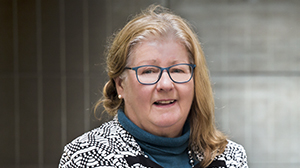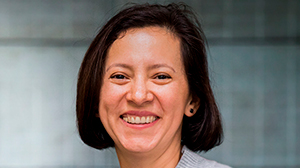- Future Students
- Current Students
- Faculty
- Staff
- Alumni
- Others
UofGH's Dr. Sarah Duni's research looks at how coalitions function

The findings are important for any advocacy coalition moving forward."
When Canada’s Minister of Agriculture and Agri-Food launched consultations on a national food policy for Canada in July 2017, the organization Food Secure Canada met with members of parliament to assist the government in shaping a policy that would help set the future of food in Canada.
University of Guelph-Humber instructor Dr. Sarah Duni recognized the weight of that moment. Dr. Duni’s PhD thesis in Policy Studies from Ryerson University explored questions relating to advocacy coalition formation and maintenance over time. Specifically, Dr. Duni looked at the development of Food Secure Canada, the only non-profit national coalition in Canada that works to address food-related issues such as food security and food sovereignty.
With a history dating back to 2001, Food Secure Canada’s consultation with the government reinforced Dr. Duni’s findings about the coalition’s robust development.
“It was important because Food Secure Canada was successful in maintaining itself over time, to the point now where they’re actually involved in the policy-making process,” Dr. Duni explained. “My research comes in to say: ‘Here’s an example of a coalition that was successful, and this is how they’re successful.’
“So the findings are important for really any advocacy coalition moving forward.”
Through a combination of interviews with long-standing coalition members, archival research, and thorough analysis of existing reports and documents produced by the coalition, Dr. Duni examined Food Secure Canada over a 10-year period to determine how the coalition maintained unity and dealt with internal differences while working to accomplish its policy goals.
Previous research has suggested one core impediment to the formation and development of a successful coalition is conflict between members over their main objectives, otherwise known as their deep core beliefs.
In the case of Food Secure Canada, the coalition established its three pillars of belief in 2004: zero hunger; a sustainable food system; and healthy and safe food. With an issue as multi-faceted as food policy, creating consensus around plans and policies could be viewed as particularly challenging.
Dr. Duni’s study found that Food Secure Canada was able to create that consensus in such a complex environment through transformative approaches including participatory democracy techniques and a restorative justice approach to consensus-making. In addition, despite challenges, the coalition strategically secured membership, information based resources, financial resources and skillful leadership.
“Food policy is a complex policy arena because so many different sectors are involved, for instance employment, health, labour, retail and distribution, education, and international affairs,” Dr. Duni explained. “Advocacy coalitions need to figure out a way to get over disagreements between these different sectors to create policy. My study explores the transformative approaches to decision making that can be helpful for advocacy coalitions who experience similar tensions.”
In fact, Dr. Duni’s findings could bear relevance for anyone interested in gaining insight into why and how groups of people and organizations come together to make difficult decisions.
“We live and breathe in an interdisciplinary world,” she said. “We sit on committees within the community with different interests at the table, and all of those interests are valid. Who is to say one interest should be taken into consideration above another?
“It’s a matter of looking at how you work through conflict and how you work through these types of issues. I think these skills are fundamental to learning, and essential in the human services field.
“Change can’t happen without a decision being made, and the question is: How do you come up with that decision?”







